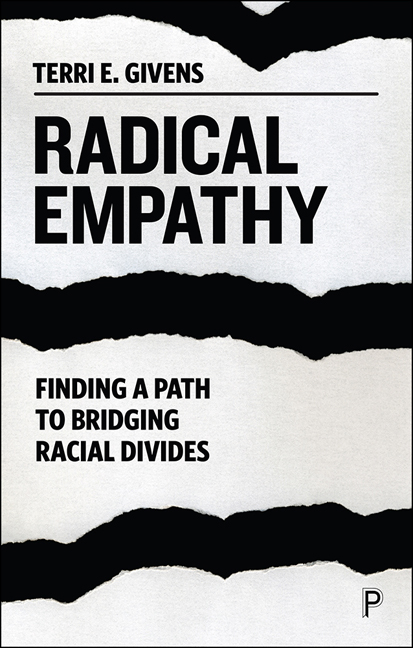Book contents
- Frontmatter
- Dedication
- Contents
- Note on the author
- Prologue:Writing in a time of crisis
- 1 Bridging divides: From racism to empathy in the 21st century
- 2 Getting to radical empathy
- 3 My family’s story: The isolation of internalized oppression
- 4 Racism and health disparities
- 5 Finding empathy in the academy
- 6 Love and marriage
- 7 Radical empathy in leadership: Creating change
- 8 Creating change at the national level: Restorative justice and working off the past
- 9 Revisiting the path to radical empathy
- Epilogue: The long road ahead
- Notes
- Suggested reading
- Index
3 - My family’s story: The isolation of internalized oppression
Published online by Cambridge University Press: 05 January 2022
- Frontmatter
- Dedication
- Contents
- Note on the author
- Prologue:Writing in a time of crisis
- 1 Bridging divides: From racism to empathy in the 21st century
- 2 Getting to radical empathy
- 3 My family’s story: The isolation of internalized oppression
- 4 Racism and health disparities
- 5 Finding empathy in the academy
- 6 Love and marriage
- 7 Radical empathy in leadership: Creating change
- 8 Creating change at the national level: Restorative justice and working off the past
- 9 Revisiting the path to radical empathy
- Epilogue: The long road ahead
- Notes
- Suggested reading
- Index
Summary
This chapter is all about a willingness to be vulnerable. When I decided to write this book, I knew that one of the most important components would be to demonstrate my own willingness to do the deep work it takes to get to radical empathy. This chapter was the hardest to write. I had to face some truths that were uncomfortable, and come to terms with a family story that didn't fit into a nice narrative about my parents’ orientation toward social justice, or even being part of the broader Black community in the city I grew up in. However, as I wrote this, I kept in mind the words of Jon Acuff: “Everybody has a story. When we don't take the time to know someone's story or worse, create our own version of it, we lose the chance to understand what they need, which is the first step to empathy.”
For many African Americans, much of the focus in the 1950s and 1960s was on the civil rights movement and the gains made through court decisions like Brown vs Board of Education that found segregated schools unconstitutional, and the passage of civil rights laws, like the 1965 Voting Rights Act. While many were out marching and some lost their lives in the fight for equality, others were simply living their lives. They made impacts in other ways, for example, in the case of my father, being one of the first Black NCOs in the Air Force as the military was desegregated.
The lives my parents led were important to the struggle as well, but they also made choices that impacted my ability to identify with my extended family and the Black community more broadly. As the youngest in the family, I have relied on my older sisters to learn about and understand many of the events that had an impact on our lives. I have also listened to the stories of my aunts, my mother's cousins, and family friends to be able to paint a more complete picture of how we were raised, and why we ended up staying in Spokane, Washington, where I grew up.
Spokane is an important player in my family's story. My father was stationed at Fairchild Air Force Base outside of the city when I was born in 1964.
- Type
- Chapter
- Information
- Radical EmpathyFinding a Path to Bridging Racial Divides, pp. 39 - 56Publisher: Bristol University PressPrint publication year: 2021



